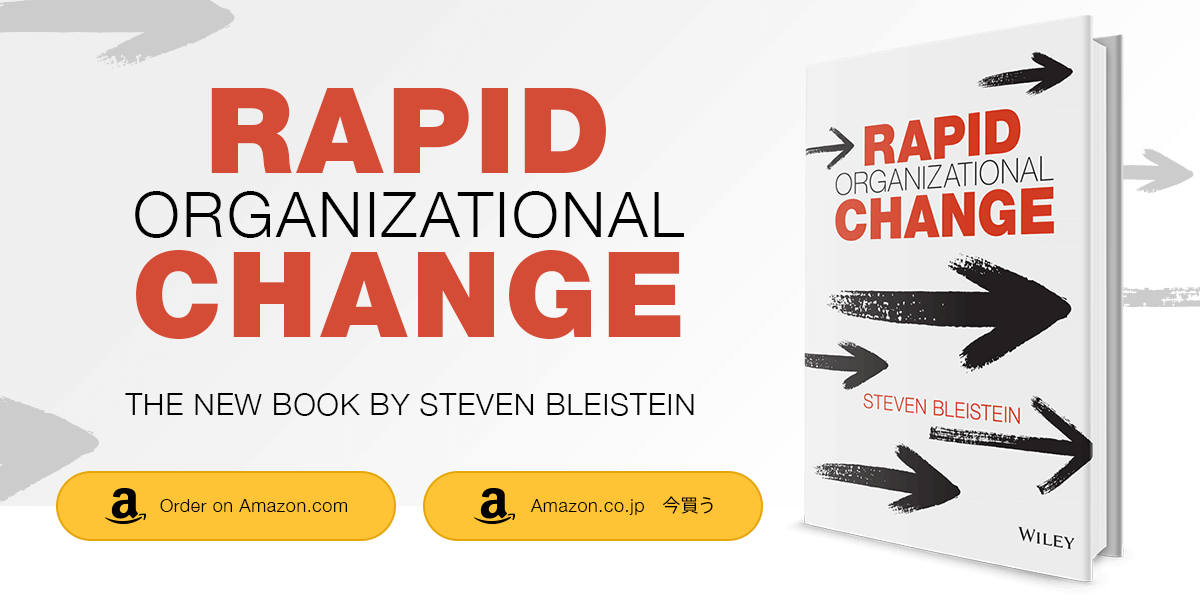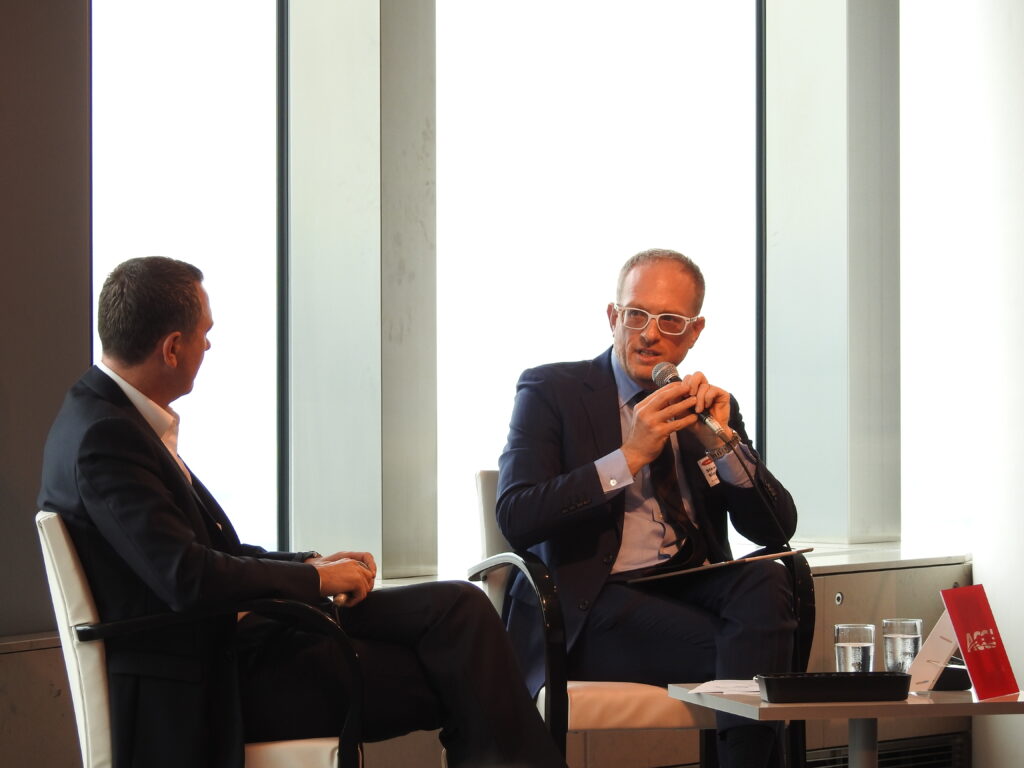[:en]On September 22nd, I conducted an on-stage conversation with BMW Group Japan CEO Peter Kronschnabl. This event, co-hosted by the American and German Chambers of Commerce, was attended by over one-hundred people on the fifty-first floor of Tokyo’s posh Roppongi Hills Club.
While this event was off-the-record, I enumerate nine of my personal takeaways below from the conversation with the insightful, innovative and consummate international business leader, Peter Kronschnabl.
1. Transparency sparks ambition. Transparency across divisions and departments, as opposed to silos, provides visibility to staff into what other career opportunities might await them in the business. Transparency is a way of sparking ambition, not just promoting collaboration and enabling understanding how one’s work affects others.
2. Lunch with junior staff. Regular, frank interactions with junior staff enable innovative ideas to reach a leader, which might normally not, and provide insight into the operating of the business that might not otherwise have been had.
3. Just pay the severance. A generous severance package that enables removal of a non-performing manager costs the business far less by orders of magnitude as opposed to the millions or tens of millions of euros lost by keeping the manager in place.
4. You can fire people legally in Japan. You simply must follow a judicious process according to local laws and regulations, just like in any other country in the world. If any HR director tells you otherwise, fire him or her.
5. Never give up on change. You will encounter setbacks when attempting change. Don’t give up because you think it is too hard. Try something else. Be patient, but determined.
6. All you need are two “multipliers.” For any kind of organizational change, as soon you have two multipliers—that is to say people in the organization who are on board and will help with the change—you know that you are on your way to success.
7. Start with the highest level leaders. Any change must start with the leaders at the top. You will achieve no progress by attempting organizational change below, if mid-level leaders are not already on board. No matter how willing staff may be, they take on change only to the degree of their immediate managers. A recalcitrant layer of mid-level managers will block all change from above from reaching staff below. I call this the refraction layer.
8. People make buying decisions based on emotion. All the other service, quality and responsiveness of after-market care are only rationalizations for the emotional decision already made. The good experience with the product keeps customers coming back for more.
9. Eschew harmony. It is disharmony in the business that drives healthy growth.
Apply these nine insights in your organization to create accelerated growth. Share on X [:ja]去る9月22日、BMWジャパンの代表取締役社長 ペーター・クロンシュナーブル氏をゲストに迎えてのインタビューを行いました。このイベントは在日米国商工会議所と在日ドイツ商工会議所との共催で、高級感漂う東京の六本木ヒルズクラブの51階で開催され、100人以上の方々にご参加いただきました。
[:ja]去る9月22日、BMWジャパンの代表取締役社長 ペーター・クロンシュナーブル氏をゲストに迎えてのインタビューを行いました。このイベントは在日米国商工会議所と在日ドイツ商工会議所との共催で、高級感漂う東京の六本木ヒルズクラブの51階で開催され、100人以上の方々にご参加いただきました。
クロンシュナーブル氏は洞察力、創造力に優れた大変有能な国際ビジネスリーダーです。非公開のインタビューではあったのですが、そこから私が個人的に学んだ9つの点をシェアしたいと思います。
1. 社内の透明性は社員の熱意に火をつける。個々の部署が孤立している会社に比べ、部や課の間に透明性のある企業では、社員達が自分の部署以外にも可能なキャリアアップの機会を見つけることができる。透明性とは、部署間の協力や理解を促進するだけではなく、野心を抱かせるのにも役に立つのである。
2. 若手社員とランチをする。定期的に若手社員とざっくばらんな会話を持つことで、彼らの画期的なアイディアがリーダーに届くことが可能となるし、また、経営に関する洞察を得られる機会も生まれてくる。
3. 退職金は潔く支払う。業績の上がらないマネージャーに十分な退職金を払ってやめてもらうことは、そのまま雇い続けることに比べると、はるかに安上がりである。
4. 日本でも、法に則って人を解雇することは可能である。海外の場合と同じく、現地の法律や決まりに従いさえすれば良いのである。もし人事責任者がそれに反対すれば、彼(もしくは彼女)を解雇するべきである。
5. 変革は諦めないこと。企業に変化を持ち込もうとする時は、まずそれを妨げるようなことが出てくるものである。変革が困難だと思われるという理由だけで挫けてはならない。何か別のやり方を試してみるべきである。忍耐強く、同時に強い意志を持って取り組もう。
6. 企業改革に必要なのは、二人のサポーターのみ。どのような企業改革においても、社内にその改革に賛成し、協力してくれる人が社内に最低二人できれば、改革は成功する方向に向かうものである。
7. 改革は会社トップから。どのような変革であっても、まず企業トップの地位にあるリーダー達から導入していかねばならない。中間レベルのリーダー達がその改革に賛成していない状態でトップより下の社員達から改革を導入させても、成果は上がらないものである。いくら社員が乗り気であっても、直属の上司が受け容れる変革以上のものを社員達が取り入れられることはない。変革に抵抗する中間レベルのマネージャーは、上から言われた改革が部下達に広まることを阻止してしまうからである。私はこれを屈折層と呼んでいる。
8. 人は感情に基づいて購買決定を行う。他のサービスポイントやクォリティ、スムーズなアフターサービスなどといったものは、すでに感情に基づいて買うかどうかを決定した後に、それを正当化するために使われる要因にすぎない。商品に満足しているかどうか、というのが、顧客がリピーターになるかどうかの決め手である。
9. 和を重要視しすぎないこと。不和こそがビジネスを成長させる要因である。
 [:]
[:]


